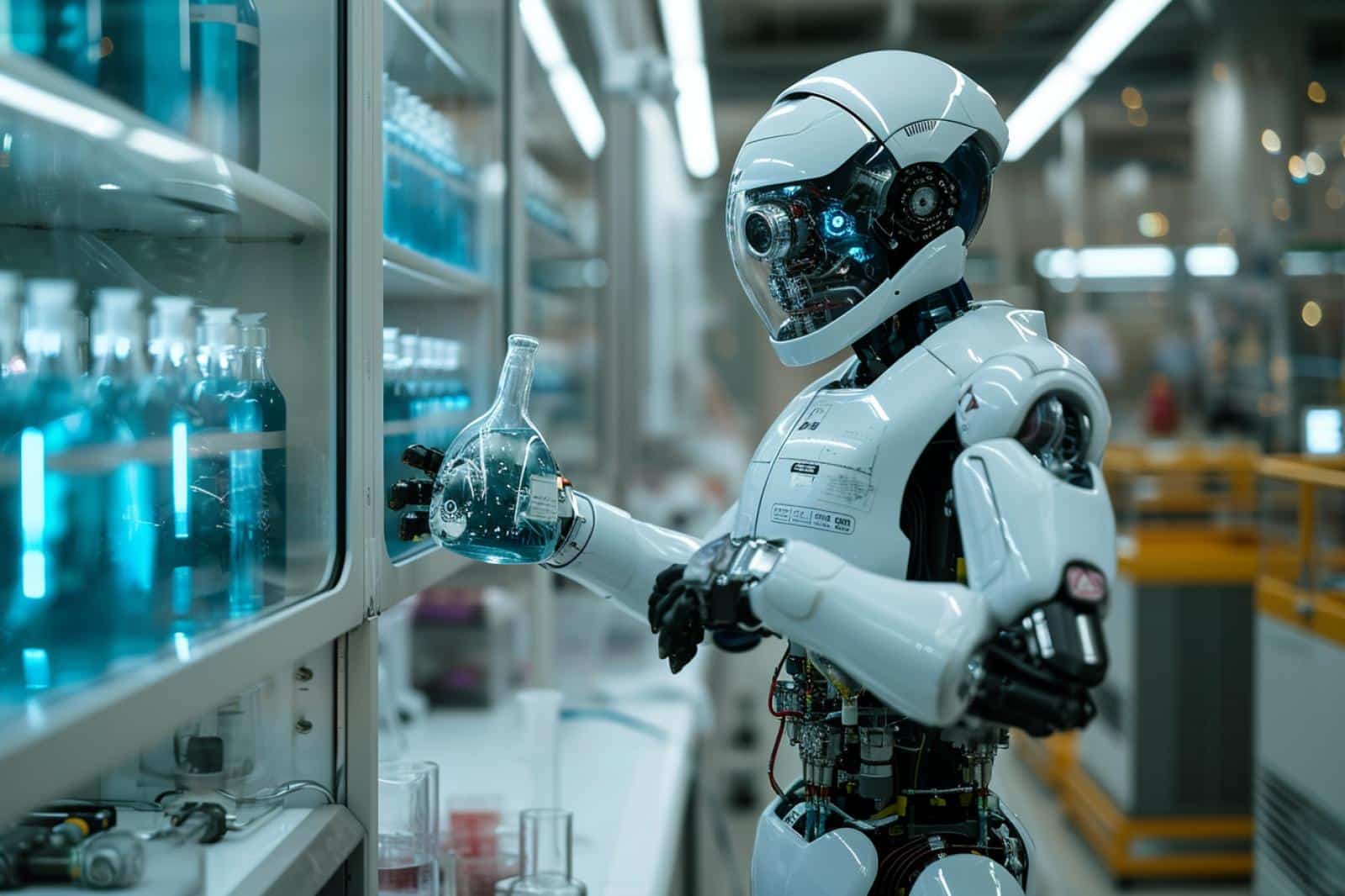The role of ai in revolutionizing pharmaceutical r&d

In the era of rapid technological advancement, artificial intelligence (AI) has become a cornerstone in various sectors, significantly transforming processes and outcomes. Particularly in the realm of pharmaceutical research and development (R&D), AI is playing an increasingly crucial role. The traditional drug discovery and development pipeline is notoriously lengthy, costly, and fraught with high failure rates. However, AI-driven approaches are streamlining this paradigm, enhancing the efficiency of discovering potential drug candidates and improving the precision of clinical trials.
For healthcare professionals, pharmaceutical companies, and patients, the integration of AI into pharmaceutical R&D heralds a new age of innovation and personalized medicine. It’s not simply about reducing the time frame for drug development, but also about elevating patient safety and tailoring treatments to individual health profiles. In this article, we will explore how AI is reshaping the landscape of pharmaceutical R&D and its implications for the future of healthcare.
Lire également : The future of ai in creative industries
Harnessing AI for Drug Discovery
The discovery of new drugs is a complex and multi-faceted process that begins with identifying potential targets for disease treatment and ends with the creation of a viable drug candidate. Traditionally, this process could take years or even decades, but with the advent of AI, particularly machine learning and deep learning, the pace of discovery has accelerated significantly.
Introduction to AI in Drug Discovery
AI algorithms excel at analyzing vast datasets, identifying patterns, and making predictions at a speed and accuracy that are unattainable for human researchers. In drug discovery, AI is utilized to sift through immense chemical libraries, biological databases, and research articles to propose potential drug candidates with high success rates. Platforms like Google Scholar offer a wealth of free articles and PMC free publications, serving as a treasure trove of data for AI systems to learn from and identify novel drug-like compounds.
En parallèle : The business of plant-based alternatives: trends and market analysis
Target Identification and Validation
The first step in drug discovery is identifying biological targets that play a key role in disease progression. AI-driven tools analyze existing data from sources like PubMed and help in predicting which proteins or genes could be potential targets for new drugs. By doing so, AI is not only expediting the discovery process but also uncovering targets that may have been overlooked by human researchers.
Compound Screening and Optimization
Once targets are identified, AI algorithms screen thousands of chemical compounds to find those that could most effectively interact with the target. This process, known as in silico screening, saves a significant amount of time and resources that would otherwise be spent on laboratory testing. Moreover, AI can optimize these compounds for better efficacy and safety before they even reach the pre-clinical stage.
Personalized Medicine and Clinical Trials
AI is not only revolutionizing the initial stages of drug discovery but also transforming the way clinical trials are conducted. By leveraging patient data, AI can personalize treatments and predict how different patient groups will respond to a drug. This approach is at the heart of personalized medicine—tailoring healthcare to the individual characteristics of each patient.
Introduction to AI in Clinical Trials
Clinical trials are a critical phase in drug development, where safety and efficacy are tested in humans. AI systems can significantly improve the design and conduct of clinical trials by analyzing real-world data and electronic health records to identify the most suitable candidates for trials. This not only accelerates the recruitment process but also enhances the likelihood of successful outcomes by focusing on participants more likely to benefit from the treatment.
Enhancing Trial Design and Monitoring
AI can predict outcomes and potential side effects, allowing researchers to design more effective trial protocols. This includes determining optimal dosages and treatment durations. Additionally, AI-powered monitoring tools can continuously analyze data from trial participants, providing real-time insights that can lead to quicker decision-making and potentially life-saving adjustments to the trial.
Predicting Drug Responses and Efficacy
Predictive analytics powered by AI can analyze various patient factors, such as genetic profiles and lifestyle choices, to predict how different groups will respond to a drug. Such insights are invaluable in ensuring that drugs are effective and safe for the intended population, thereby increasing the success rate of clinical trials.
Data-Driven Decision Making
In the pharmaceutical industry, decision-making can be a matter of life and death. Each step in the R&D process must be meticulously planned and executed. AI’s ability to analyze data and predict outcomes is a game-changer for pharmaceutical companies, enabling them to make more informed decisions at every stage of drug development.
Introduction to AI in Decision Making
AI systems can process and learn from historical data, current studies, and ongoing trials, providing a comprehensive overview that aids in strategic decision-making. This is particularly beneficial in the pharmaceutical industry, where the right decisions can lead to significant advancements in patient health and treatment options.
Streamlining R&D Processes
By integrating AI into their R&D processes, pharmaceutical companies can streamline operations, prioritize resources more effectively, and reduce the time to market for new drugs. This results in cost savings and, more importantly, faster access to treatments for patients in need.
Risk Assessment and Management
Risk assessment is a critical part of drug development. AI can predict potential failures and identify risk factors early in the development process, enabling companies to mitigate issues before they become costly problems. This proactive approach to risk management ensures that only the most promising drug candidates move forward in the development pipeline.
Empowering the Pharmaceutical Industry
AI is empowering the pharmaceutical industry to overcome some of its most daunting challenges. Drug discovery and development are becoming more efficient, cost-effective, and patient-centric, thanks to the capabilities of AI.
Introduction to the Impact of AI
By adopting AI, pharmaceutical companies are positioning themselves at the forefront of innovation. They are not only enhancing their R&D capabilities but also contributing to a healthcare system that is more responsive to patient needs.
Fostering Innovation and Collaboration
AI facilitates collaboration across the pharmaceutical industry, academia, and healthcare institutions. By sharing data and insights, these entities can work together to accelerate the discovery and development of new drugs. This collaborative ecosystem is vital for tackling complex diseases and finding cures more quickly.
Creating New Opportunities
The advancements in AI are creating new opportunities for drug design and personalized medicine. Drugs can now be designed with specific patient groups in mind, and treatments can be tailored to individual patient profiles, leading to better health outcomes and a more efficient healthcare system.
Conclusion: The Future of Healthcare with AI
As we venture further into the age of AI, the role of artificial intelligence in pharmaceutical R&D is undeniable. AI is not just an auxiliary tool; it is becoming the backbone of discovery and development processes, driving innovation at an unprecedented scale. The benefits extend beyond the pharmaceutical companies to the very heart of healthcare—improving outcomes for patients around the world.
The integration of AI is leading to the discovery of potential drugs faster and more accurately, the development of more personalized treatments, and the enhancement of decision-making capabilities within the pharmaceutical industry. As AI continues to evolve, we can expect to see even more transformative effects on pharmaceutical R&D, making treatments more accessible and effective for all patients.
The promise of AI in revolutionizing pharmaceutical R&D lies in its potential to fundamentally change how we approach health challenges. As stakeholders in the healthcare ecosystem, you stand at the cusp of a new era where AI’s intelligence and learning capabilities merge with human ingenuity to forge a future where diseases are not just treated but preempted and eradicated. The journey has just begun, and the possibilities are limitless.
